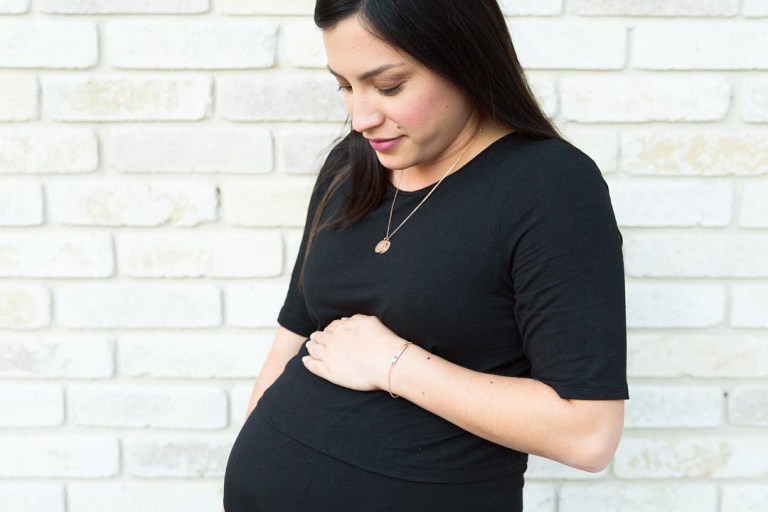
Everything You Need to Know About Round Ligament Pain During Pregnancy
Learn what it is, where it’s located and how to relieve round ligament pain during your pregnancy.

In This Article
Being pregnant comes with a whole range of new sensations as your body goes through changes to make room for your growing little one. Sometimes those changes can cause a bit of discomfort, but usually, they’re perfectly normal.
Such is the case with round ligament pain, which is a common pregnancy symptom.
What is round ligament pain?
According to the Cleveland Clinic, round ligaments are ropey bands of tissue—kind of like bungee cords—that connect the uterus to the groin area. When your baby bump grows up and out during pregnancy, these round ligaments are stretched from the groin area upward into the abdomen and hip areas.
As the ligaments stretch, they become tighter and can cause some women to experience round ligament pain.
What does round ligament pain feel like?
Usually, you’ll feel a sharp, sudden pain on one or both sides of the lower belly, hips or groin area. But, round ligament pain can also make your lower belly feel achy after you’ve done more physical activity than usual. “For some people it’s a dull, achy feeling all day,” explains Al Bradlea, a Dona-certified doula and lactation consultant. “But it’s often short, sharp pangs, almost like a Charley horse that’s happening in your groin or hips or lower belly.”
When does round ligament pain start?
Round ligaments become more strained as your baby grows. First-time moms usually start to show around 16 weeks pregnant to 20 weeks pregnant, but your bump will show sooner if you’ve had a baby before.
Either way, the second trimester is when your uterus outgrows your pelvis and pushes up into the abdomen. This is when most women start to feel round ligament pain.
“Round ligament pain may be aggravated by being sedentary all day,” explains Bradlea. “Other things that aggravate it are struggling with good posture or having a weaker core. It just means your body is having a harder time compensating for this expanding weight in your front.”
How long does round ligament pain last?
Round ligament pain during pregnancy is most frequent during the second trimester, but it may continue into the third trimester as well. The actual pain itself lasts only a few seconds at a time, but overworked ligaments—from an especially active day—can leave you feeling achy for hours. “Generally speaking it should come and go,” says Bradlea.
What are the symptoms of round ligament pain?
The good news is that round ligament pain isn’t constant—it comes and goes. And, for many women, it stops altogether at some point in later pregnancy. The Cleveland Clinic cautions that you may have round ligament pain if you have any of these symptoms:
A sharp, shooting pain when you quickly change positions: Pain often occurs when you roll over in bed, go from sitting to standing, or when you cough or laugh.
Pain in the lower abdomen or pelvis: Round ligaments stretch from your groin area up to your belly and hips during pregnancy. You can feel discomfort in any of those regions.
More discomfort after physical activity: Extended ligaments bear more stress when you’re moving around. Increased physical activity (e.g. walking around all day) can lead to feelings of achiness.
If resting doesn’t relieve your discomfort or your pain becomes constant or severe, contact your doctor.
Seek immediate care if you have any of these symptoms:
Intense pain or cramping
Fever or chills
Bleeding
Painful urination
Unusual vaginal discharge
Lightheadedness or dizziness
Contractions (Braxton Hicks contractions are normal, however)
“Know that round ligament pain is normal, but you should talk to your doctor if you have other symptoms or if you feel like baby isn’t moving as much as usual,” says Bradlea.
Round ligament pain relief and treatment
Even though it’s considered one of the normal aches and pains that come with being pregnant, round ligament pain can be frustrating. The best way to ease your discomfort is to prevent it from occurring, when possible. These measures may help, according to the Cleveland Clinic:
Take it easy: Avoid exercising harder or longer than usual. Try a gentler form of exercise if round ligament pain increases during or after your normal workout. Talk to your healthcare provider about gentle exercises—like swimming—that might be right for you.
Move more slowly: Take your time when getting up from sitting or lying down.
Stretching: Gentle stretches like pelvic tilts and rocks can help relieve the pain, as can prenatal yoga. Just be careful not to overdo it!
Wear a belly belt: These wide, rigid belts are worn under your belly to help support your bump and relieve round ligament pain and hip discomfort.
A bath: This can help soothe your round ligament pain—just make sure the water is warm, not hot.
Consider a pain reliever: Depending on the severity of pain, you might want to take a pregnancy-safe pain reliever such as Tylenol.
Talk to your doctor: If your pain gets particularly bad or frequent, your OB-GYN can check to make sure there are no other problems that could be causing pain.
Round ligament pain is another pregnancy symptom that signals your body is working hard to support your growing baby. And, it can be a good reminder that now is a great time to take it easy and focus on self-care and relaxation before your baby arrives.
